Probiotic treatment for women with gestational diabetes to improve maternal and infant health and well-being
- PMID: 32575163
- PMCID: PMC7386668
- DOI: 10.1002/14651858.CD012970.pub2
Probiotic treatment for women with gestational diabetes to improve maternal and infant health and well-being
Abstract
Background: Gestational diabetes mellitus (GDM) is carbohydrate intolerance first recognised during pregnancy and associated with complications for mothers and babies. Probiotics are naturally occurring micro-organisms, which when ingested in adequate amounts, may confer health benefits. Evidence of the role of probiotics as treatment for GDM is limited.
Objectives: To evaluate the safety and effectiveness of probiotics in treating women with GDM on maternal and infant outcomes.
Search methods: We searched the Cochrane Pregnancy and Childbirth's Trials Register ClinicalTrials.gov, WHO International Clinical Trials Registry Platform (ICTRP) (24 July 2019), and reference lists of retrieved studies.
Selection criteria: Randomised controlled trials (RCTs) comparing the use of probiotics versus placebo/standard care for the treatment of GDM.
Data collection and analysis: Two review authors independently assessed study eligibility, extracted data, checked data accuracy, and assessed risk of bias of included trials. The certainty of evidence for selected maternal and infant/child outcomes was assessed using GRADE.
Main results: Nine RCTs (695 pregnant women with GDM) comparing probiotics versus placebo were identified. The overall risk of bias in the nine RCTs was low to unclear and the evidence was downgraded for imprecision due to the small numbers of women participating in the trials. The trials were carried out in hospitals and universities in Iran (seven trials), Thailand (one trial) and Ireland (one trial). All trials compared probiotics with placebo. Maternal outcomes We are uncertain if probiotics have any effect compared with placebo on hypertensive disorders of pregnancy, (risk ratio (RR) 1.50, 95% confidence interval (CI) 0.64 to 3.53; participants = 256; studies = 3; low-certainty evidence) and mode of birth as caesareans (average RR 0.64, 95% CI 0.30 to 1.35; participants = 267; studies = 3; low-certainty evidence) because the certainty of evidence is low and the 95% CIs span possible benefit and possible harm. No trials reported primary outcomes of: mode of birth as vaginal/assisted and subsequent development of type 2 diabetes. We are uncertain if probiotics have any effect compared with placebo on induction of labour (RR 1.33, 95% CI 0.74 to 2.37; participants = 127; studies = 1; very low-certainty evidence). For other secondary maternal outcomes, we are uncertain if there are differences between probiotics and placebo for: postpartum haemorrhage; weight gain during pregnancy intervention and total gestational weight gain; fasting plasma glucose and need for extra pharmacotherapy (insulin). Probiotics may be associated with a slight reduction in triglycerides and total cholesterol. In probiotics compared with placebo, there was evidence of reduction in markers for insulin resistance (HOMA-IR) and HOMA-B; and insulin secretion. There was also an increase in quantitative insulin sensitivity check index (QUICKI). Probiotics were associated with minor benefits in relevant bio-markers with evidence of a reduction in inflammatory markers high-sensitivity C-reactive protein (hs-CRP), interleukin 6 (IL-6), and marker of oxidative stress malondialdehyde; and an increase in antioxidant total glutathione, but we are uncertain if there is any difference in total antioxidant capacity. No trials reported secondary outcomes: perineal trauma, postnatal weight retention or return to pre-pregnancy weight and postnatal depression. Infant/child/adult outcomes We are uncertain if probiotics have any effect, compared with placebo, on the risk of large-for-gestational-age babies (RR 0.73, 95% CI 0.35 to 1.52; participants = 174; studies = 2; low-certainty evidence) or infant hypoglycaemia (RR 0.85, 95% CI 0.39 to 1.84; participants = 177; studies = 3; low-certainty evidence) because the certainty of evidence is low and the 95% CIs span possible benefit and possible harm. No trials reported primary outcomes of: perinatal (fetal/neonatal) mortality; or neurosensory disability. For other secondary outcomes, we are uncertain if there is any difference between probiotics and placebo in gestational age at birth, preterm birth, macrosomia, birthweight, head circumference, length, infant hypoglycaemia, and neonatal intensive care unit (NICU) admissions. There was evidence of a reduction in infant hyperbilirubinaemia with probiotics compared with placebo. No trials reported secondary outcomes: infant adiposity, and later childhood adiposity. There were no adverse events reported by any of the trials.
Authors' conclusions: Low-certainty evidence means we are not certain if there is any difference between probiotic and placebo groups in maternal hypertensive disorders of pregnancy, caesareans; and large-for-gestational-age babies. There were no adverse events reported by the trials. Due to the variability of probiotics used and small sample sizes of trials, evidence from this review has limited ability to inform practice. Well-designed adequately-powered trials are needed to identify whether probiotics may improve maternal blood glucose levels and/or infant/child/adult outcomes; and whether they can be used to treat GDM.
Trial registration: ClinicalTrials.gov NCT03864549.
Copyright © 2020 The Cochrane Collaboration. Published by John Wiley & Sons, Ltd.
Conflict of interest statement
Karaponi Okesene‐Gafa ‐ was recently involved with the Healthy Mums and Babies (HUMBA) randomised controlled demonstration trial, which has now been completed and published. The HUMBA RCT is not be eligible for inclusion in this review. In kind we have been provided with probiotics (
Abigail Moore is a medical student and declares no conflict of interest.
Vanessa Jordan is a Research Fellow in the University of Auckland and declares no conflict of interest.
Lesley McCowan ‐ was also involved with the Healthy Mums and Babies (HUMBA) randomised controlled demonstration trial. The HUMBA RCT is not be eligible for inclusion in this review. In kind we have been provided with probiotics (
Caroline Crowther ‐ was also involved with the Healthy Mums and Babies (HUMBA) randomised controlled demonstration trial. The HUMBA RCT is not be eligible for inclusion in this review. In kind we have been provided with probiotics (
Figures

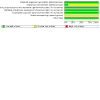
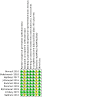
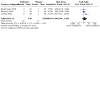
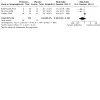
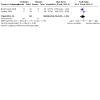

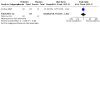
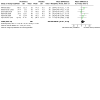
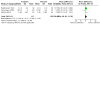

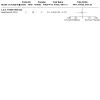
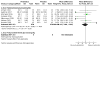
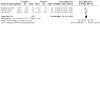
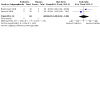

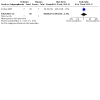
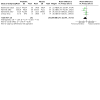
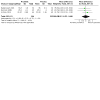
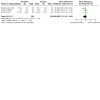
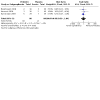
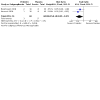
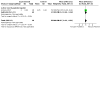
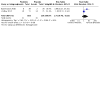
Update of
References
References to studies included in this review
Ahmadi 2016 {published data only}
-
- Ahmadi S, Jamilian M, Tajabadi-Ebrahimi M, Jafari P, Asemi Z. The effects of synbiotic supplementation on markers of insulin metabolism and lipid profiles in gestational diabetes: a randomised, double-blind, placebo-controlled trial. British Journal of Nutrition 2016;116(8):1394-401. - PubMed
-
- Anonymous. Corrigendum: the effects of synbiotic supplementation on markers of insulin metabolism and lipid profiles in gestational diabetes: a randomized, double-blind, placebo-controlled trial (British Journal of Nutrition (2016) DOI: 10.1017/S0007114516003457). British Journal of Nutrition 2016;116(11):1998. [CENTRAL: CN-01298950] [EMBASE: 613758353] - PubMed
-
- Asemi Z, IRCT201605085623N77. Clinical trial of the effect of synbiotic supplementation compared with the placebo on metabolic profiles in patients with gestational diabetes. http://en.irct.ir/trial/6107 (first received 11 May 2016).
Badehnoosh 2018 {published data only}
-
- Asemi Z, IRCT201611115623N91. Clinical trial of the effect of probiotic supplementation compared with the placebo on pregnancy outcomes in women with gestational diabetes. http://en.irct.ir/trial/6121 (first received 23 November 2016).
-
- Badehnoosh B, Karamali M, Zarrati M, Jamilian M, Bahmani F, Tajabadi-Ebrahimi M, et al. The effects of probiotic supplementation on biomarkers of inflammation, oxidative stress and pregnancy outcomes in gestational diabetes. Journal of Maternal-Fetal & Neonatal Medicine 2018;31(9):1128-36. - PubMed
Hajifaraji 2017 {published data only}
-
- Hajifaraji M, IRCT201405181597N3. Effect of probiotics in comparison with placebo on glucose metabolism, weight changes and inflammatory and oxidative stress indices in women with gestational diabetes mellitus. http://en.irct.ir/trial/1005 (first received 16 June 2014).
-
- Hajifaraji M, Jahanjou F, Abbasalizadeh F, Aghamohammadzadeh N, Abbasi MM, Dolatkhah N. Effect of probiotic supplementation on blood pressure of females with gestational diabetes mellitus: a randomized double blind controlled clinical trial. Iranian Red Crescent Medical Journal 2017;19(6):e55662.
-
- Hajifaraji M, Jahanjou F, Abbasalizadeh F, Aghamohammadzadeh N, Abbasi MM, Dolatkhah N. Effect of probiotic supplements in women with gestational diabetes mellitus on inflammation and oxidative stress biomarkers: a randomized clinical trial. Asia Pacific Journal of Clinical Nutrition 2018;27(3):581-91. - PubMed
Jafarnejad 2016 {published data only}
Karamali 2016 {published data only}
-
- Asemi Z, IRCT201601035623N63. Clinical trial of the effect of probiotic supplementation compared with the placebo on metabolic profiles in patients with gestational diabetes. http://en.irct.ir/trial/6093 (first received 3 January 2016).
-
- Karamali M, Dadkhah F, Sadrkhanlou M, Jamilian M, Ahmadi S, Tajabadi-Ebrahimi M, et al. Effects of probiotic supplementation on glycaemic control and lipid profiles in gestational diabetes: a randomized, double-blind, placebo-controlled trial. Diabetes & Metabolism 2016;42(4):234-41. - PubMed
Karamali 2018 {published data only}
-
- Asemi Z, IRCT201704205623N108. Clinical trial of the effect of synbiotic supplementation compared with the placebo on pregnancy outcomes in women with gestational diabetes. http://en.irct.ir/trial/6138 (first received 27 April 2017).
-
- Karamali M, Nasiri N, Taghavi Shavazi N, Jamilian M, Bahmani F, Tajabadi-Ebrahimi M, et al. The effects of synbiotic supplementation on pregnancy outcomes in gestational diabetes. Probiotics and Antimicrobial Proteins 2018;10(3):496-503. - PubMed
Kijmanawat 2019 {published data only}
-
- Kijmanawat A, Panburana P, Reutrakul S, Tangshewinsirikul C. Erratum to: effects of probiotic supplements on insulin resistance in gestational diabetes mellitus: a double-blind randomized controlled trial (Journal of Diabetes Investigation, (2019), 10, 1, (163-170), 10.1111/jdi.12863) [Erratum to: Effects of probiotic supplements on insulin resistance in gestational diabetes mellitus: A double-blind randomized controlled trial (Journal of Diabetes Investigation, (2019), 10, 1, (163-170), 10.1111/jdi.12863)]. Journal of Diabetes Investigation 2019;10(5):1388. [CENTRAL: CN-02003802] [EMBASE: 2002646319] - PMC - PubMed
-
- Kijmanawat A, TCTR20170606002. Study of probiotic supplements to reduce insulin resistance in gestational diabetes mellitus. http://www.clinicaltrials.in.th/index.php?tp=regtrials&menu=trialsea... (first received 5 June 2017).
Lindsay 2015 {published data only}ISRCTN97241163
-
- Lindsay K, Brennan L, Kennelly M, Maguire O, Smith T, Curran S, et al. Impact of probiotics in women with gestational diabetes mellitus on metabolic health: a randomized controlled trial. American Journal of Obstetrics and Gynecology 2015;212(1 Suppl 1):S22. - PubMed
-
- Lindsay KL, Brennan L, Kennelly MA, Maguire OC, Smith T, Curran S, et al. Impact of probiotics in women with gestational diabetes mellitus on metabolic health: a randomized controlled trial. American Journal of Obstetrics & Gynecology 2015;212:496.e1-496.e.11. - PubMed
-
- McAuliffe F, ISRCTN97241163. A randomised controlled trial of probiotics in pregnancy to reduce maternal glucose in obese and gestational diabetic women. http://www.isrctn.com/ISRCTN97241163 (first received 5 February 2012).
Nabhani 2018 {published data only}
-
- Gargari BP, IRCT201511183140N16. Effect of synbiotic supplementation on lipid profile, glycemic control and hs-CRP in women with gestational diabetes mellitus. http://en.irct.ir/trial/3183 (first received 29 December 2015).
-
- Nabhani Z/Hezaveh SJ, Razmpoosh E, Asghari-Jafarabadi M, Gargari BP. The effects of synbiotic supplementation on insulin resistance/sensitivity, lipid profile and total antioxidant capacity in women with gestational diabetes mellitus: a randomized double blind placebo controlled clinical trial. Diabetes Research and Clinical Practice 2018;138:149-57. - PubMed
References to studies excluded from this review
Al‐Dughaishi 2016 {published data only}
-
- Al-Dughaishi T, Nikolic D, Zadjali F, Al-Hashmi K, Al-Waili K, Rizzo M, et al. Nutraceuticals as lipid-lowering treatment in pregnancy and their effects on the metabolic syndrome. Current Pharmaceutical Biotechnology 2016;17(7):614-23. - PubMed
Asemi 2013 {published data only}
-
- Asemi Z, Samimi M, Tabassi Z, Naghibi Rad M, Rahimi Foroushani A, Khorammian H, et al. Effect of daily consumption of probiotic yoghurt on insulin resistance in pregnant women: a randomized controlled trial. European Journal of Clinical Nutrition 2013;67(1):71-4. - PubMed
Asemi 2013a {published data only}
-
- Asemi Z, Zare Z, Shakeri H, Sabihi S, Esmaillzadeh A. Effect of multispecies probiotic supplements on metabolic profiles, hs-CRP, and oxidative stress in patients with type 2 diabetes. Annals of Nutrition and Metabolism 2013;63(1-2):1-9. - PubMed
Barrett 2012 {published data only}
Barrett 2014 {published data only}
Barthow 2016 {published data only}
-
- Barthow C, Wickens K, Stanley T, Mitchell EA, Maude R, Abels P, et al. The Probiotics in Pregnancy Study (PiP Study): rationale and design of a double-blind randomised controlled trial to improve maternal health during pregnancy and prevent infant eczema and allergy. BMC Pregnancy & Childbirth 2016;16(1):133. - PMC - PubMed
Fei 2014 {published data only}
-
- Fei BB, Ling L, Hua C, Ren SY. Effects of soybean oligosaccharides on antioxidant enzyme activities and insulin resistance in pregnant women with gestational diabetes mellitus. Food Chemistry 2014;158:429-32. - PubMed
Gomez 2015 {published data only}
-
- Gomez Arango LF, Barrett HL, Callaway LK, Nitert MD. Probiotics and pregnancy. Current Diabetes Reports 2015;15(1):567. [DOI: ] - PubMed
Hamano 2013 {published data only}
-
- Hamano K, UMIN000012416. The efficacy of the probiotics for gestational diabetes patients. https://upload.umin.ac.jp/cgi-open-bin/ctr_e/ctr_view.cgi?recptno=R00001... (first received 1 December 2013).
Lindsay 2013 {published data only}
-
- Lindsay KL, Walsh CA, Brennan L, McAuliffe FM. Probiotics in pregnancy and maternal outcomes: a systematic review. Journal of Maternal-Fetal and Neonatal Medicine 2013;26(8):772-8. - PubMed
Lindsay 2014 {published data only}
-
- Lindsay K, Maguire O, Smith T, Brennan L, McAuliffe F. A randomized controlled trial of probiotics to reduce maternal glycaemia in obese pregnancy. American Journal of Obstetrics and Gynecology 2014;1:S342. - PubMed
Luoto 2010 {published data only}
-
- Luoto R, Laitinen K, Nermes M, Isolauri E. Impact of maternal probiotic-supplemented dietary counselling on pregnancy outcome and prenatal and postnatal growth: a double-blind, placebo-controlled study. British Journal of Nutrition 2010;103(12):1792-9. - PubMed
Muktabhant 2015 {published data only}
Nitert 2013 {published data only}
Okesene‐Gafa 2018 {published data only}
-
- Okesene-Gafa K, McKinlay CJ, Li M, Taylor RS, Wall CR, Rush EC, et al. Dietary intervention and/or probiotic capsules in obese pregnant women-effect on gestational weight gain and infant birthweight: Healthy mums and babies (HUMBA) trial. Journal of Paediatrics and Child Health 2018;54 (Supplement 1):4-5.
Wickens 2017 {published data only}
-
- Wickens KL, Barthow CA, Murphy R, Abels PR, Maude RM, Stone PR, et al. Early pregnancy probiotic supplementation with Lactobacillus rhamnosus HN001 may reduce the prevalence of gestational diabetes mellitus: a randomised controlled trial. British Journal of Nutrition 2017;117(6):804-13. - PMC - PubMed
Zhang 2018 {published data only}
-
- Zhang F, ChiCTR1800015853. Study on the effect of probiotics on the improvement of intestinal flora in gestational diabetes mellitus. http://www.chictr.org.cn/showproj.aspx?proj=25072 (first received 24 April 2018).
References to studies awaiting assessment
Gonai 2014 {published data only}
-
- Gonai M, Nakadaira I, Kurasaki K, Hamano K. The effects of lactobacilli on glycemic control and the secretion of glucagon-like peptide-1 in Japanese gestational diabetes mellitus patients. Diabetes 2014;63(Suppl 1):A333, Abstract no: 1278-P.
Jamilian 2019 {published data only}
-
- Asemi Z, IRCT201706075623N119. Clinical trial of the effect of combined probiotic and vitamin D supplementation compared with the placebo on metabolic profiles in women with gestational diabetes. http://en.irct.ir/trial/6149 (first received 9 June 2017).
-
- Jamilian M, Amirani E, Asemi Z. The effects of vitamin D and probiotic co-supplementation on glucose homeostasis, inflammation, oxidative stress and pregnancy outcomes in gestational diabetes: a randomized, double-blind, placebo-controlled trial. Clinical Nutrition (Edinburgh, Scotland) 2019;38(5):2098-105. [CENTRAL: CN-01667601] [EMBASE: 2001290656] - PubMed
References to ongoing studies
Asemi 2019 {published data only}
-
- Asemi Z//IRCT20170513033941N55. The effects of selenium and probiotics co-supplementation on on pregnancy outcomes, inflammatory factors, oxidative stress biomarkers and gene expression related to inflammation in women with gestational diabetes. http://en.irct.ir/trial/38429 (first received 5 April 2019).
CTRI/2018/08/015432 {published data only}
-
- Ramanathan K, CTRI/2018/08/015432. Effect of probiotic supplementation on blood glucose of gestational diabetic mellitus (GDM) mothers. http://www.ctri.nic.in/Clinicaltrials/pmaindet2.php?trialid=27682 (first received 23 August 2018).
IRCT20121224011862N2 {published data only}
-
- Sahaf F, IRCT20121224011862N2. The effect of probiotic yogurt and conventional yogurt in blood glucose control and outcomes of pregnancy in women with gestational diabetes. http://en.irct.ir/trial/29872 (first received 19 May 2018).
IRCT2015110310089N4 {published data only}
-
- Fani A, IRCT2015110310089N4. Comparison of probiotic capsules and placebo on fasting blood sugar and metabolic parameters in pregnant woman with gestational diabetes or impaired glucose tolerance test. http://en.irct.ir/trial/10568 (first received 1 February 2016).
IRCT20171010036697N1 {published data only}
-
- Asemi Z, IRCT20171010036697N1. The effect of probiotic supplementation on gene expression related to insulin, lipid and inflammation in patients with gestational diabetes. http://en.irct.ir/trial/27359 (first received 3 January 2018).
Nachum 2019 {published data only}
-
- Nachum Z//NCT03864549. The effect of oral probiotics on glycemic control of women with gestational diabetes mellitus - randomized, double blind, placebo controlled trial, phase 4. https://clinicaltrials.gov/ct2/show/NCT03864549 (first received 6 March 2019. - PubMed
Additional references
ACOG 2001
-
- American College of Obstetricians and Gynecologists Committee on Practice Bulletins-Obstetrics. ACOG Practice Bulletin. Clinical management guidelines for obstetrician-gynecologists. Number 30, September 2001 (replaces Technical Bulletin Number 200, December 1994). Gestational Diabetes. Obstetrics & Gynecology 2001;98(3):525-38. - PubMed
ADA 2010
Alberti 1998
-
- Alberti KG, Zimmet PZ. Definition, diagnosis and classification of diabetes mellitus and its complications. Part 1: diagnosis and classification of diabetes mellitus provisional report of a WHO consultation. Diabetic Medicine 1998;15(7):539-53. - PubMed
AlFaleh 2014
-
- AlFaleh K, Anabrees J. Probiotics for prevention of necrotizing enterocolitis in preterm infants. Evidence-Based Child Health: a Cochrane Review journal 2014;9(3):584-671. - PubMed
Allen 2010
-
- Allen SJ, Jordan S, Storey M, Thornton CA, Gravenor M, Garaiova I, et al. Dietary supplementation with lactobacilli and bifidobacteria is well tolerated and not associated with adverse events during late pregnancy and early infancy. Journal of Nutrition 2010;140(3):483-8. - PubMed
Andreasen 2010
-
- Andreasen AS, Larsen N, Pedersen-Skovsgaard T, Berg RM, Moller K, Svendsen KD, et al. Effects of Lactobacillus acidophilus NCFM on insulin sensitivity and the systemic inflammatory response in human subjects. British Journal of Nutrition 2010;104(12):1831-8. - PubMed
Benton 2007
-
- Benton D, Williams C, Brown A. Impact of consuming a milk drink containing a probiotic on mood and cognition. European Journal of Clinical Nutrition 2007;61(3):355-61. - PubMed
Boney 2005
-
- Boney CM, Verma A, Tucker R, Vohr BR. Metabolic syndrome in childhood: association with birth weight, maternal obesity, and gestational diabetes mellitus. Pediatrics 2005;115(3):e290-6. - PubMed
Braentsaeter 2011
Brown 2017
Callaway 2019
-
- Callaway LK, McIntyre HD, Barrett HL, Foxcroft K, Tremellen A, Lingwood BE, et al. Probiotics for the prevention of gestational diabetes mellitus in overweight and obese women: findings from the SPRING double-blind randomized controlled trial. Diabetes Care Jan 18;42(3):364-71. [DOI: ] - PubMed
Collado 2008
-
- Collado MC, Isolauri E, Laitinen K, Salminen S. Distinct composition of gut microbiota during pregnancy in overweight and normal-weight women. American Journal Clinical Nutrition 2008;88(4):894-9. - PubMed
Coustan 2013
-
- Coustan DR. Gestational diabetes mellitus. Clinical Chemistry 2013;59(9):1310-21. - PubMed
Crowther 2005
-
- Crowther CA, Hiller JE, Moss JR, McPhee AJ, Jeffries WS, Robinson JS. Australian carbohydrate intolerance study in pregnant women trial group. Effect of treatment of gestational diabetes mellitus on pregnancy outcomes. New England Journal of Medicine 2005;352(24):2477-86. - PubMed
Cundy 2014
-
- Cundy T, Ackermann E, Ryan EA. Gestational diabetes: new criteria may triple the prevalence but effect on outcomes is unclear. BMJ 2014;348:g1567. - PubMed
Dabelea 2005
-
- Dabelea D, Snell-Bergeon JK, Hartsfield CL, Bischoff KJ, Hamman RF, McDuffie RS, Kaiser Permanente of Colorado GDMSP. Increasing prevalence of gestational diabetes mellitus (GDM) over time and by birth cohort: Kaiser Permanente of Colorado GDM Screening Program. Diabetes Care 2005;28(3):579-84. - PubMed
Diabetes Care 2010
-
- International Association of Diabetes and Pregnancy Study Groups Consensus Panel, Metzger BE, Gabbe SG, Persson B, Buchanan TA, Catalano PA, Damm P, et al. International association of diabetes and pregnancy study groups recommendations on the diagnosis and classification of hyperglycemia in pregnancy. Diabetes Care 2010;33(3):676-82. - PMC - PubMed
Dinan 2011
-
- Dinan TG, Quigley EM. Probiotics in the treatment of depression: science or science fiction? Australian & New Zealand Journal of Psychiatry 2011;45(12):1023-5. - PubMed
Ejtahed 2012
-
- Ejtahed HS, Mohtadi-Nia J, Homayouni-Rad A, Niafar M, Asqhari-Jafarabadi M, Mofid V. Probiotic yogurt improves antioxidant status in type 2 diabetic patients. Nutrition 2012;28(5):539-43. - PubMed
Ekeroma 2015
-
- Ekeroma AJ, Chandran GS, McCowan L, Ansell D, Eagleton C, Kenealy T. Impact of using the international association of diabetes and pregnancy study groups criteria in South Auckland: prevalence, interventions and outcomes. Australian and New Zealand Journal of Obstetrics and Gynaecology 2015;55:34-41. - PubMed
Elias 2011
FAO 2001
-
- FAO - Food, Agriculture Organization of the United Nations World Health Organization. Health and nutritional properties of probiotics in food including powder milk with live lactic acid bacteria. http://www.who.int/foodsafety/publications/fs_management/en/probiotics.pdf (accessed 2015). 2001:1-34.
Ferrara 2007
-
- Ferrara A. Increasing prevalence of gestational diabetes mellitus: a public health perspective. Diabetes Care 2007;30(Suppl 2):S141-6. - PubMed
Flint 2012
-
- Flint HJ. The impact of nutrition on the human microbiome. Nutrition Reviews 2012;70:Suppl 1:S10-3. - PubMed
Higgins 2011
-
- Higgins JP, Green S. Cochrane Handbook for Systematic Reviews of Interventions Version 5.1.0 [updated March 2011]. The Cochrane Collaboration, 2011. Available from www.cochrane-handbook.org.
Jiang 2015
-
- Jiang H, Ling Z, Zhang Y, Mao H, Ma Z, Yin Y, et al. Altered fecal microbiota composition in patients with major depressive disorder. Brain, Behavior, and Immunity 2015;4:186-94. - PubMed
Kim 2002
-
- Kim C, Newton KM, Knopp RH. Gestational diabetes and the incidence of type 2 diabetes: a systematic review. Diabetes Care 2002;25(10):1862-8. - PubMed
Koren 2012
Laitinen 2009
-
- Laitinen K, Poussa T, Isolauri E, Allergy Mucosal Immunology Intestinal Microbiota Group. Probiotics and dietary counselling contribute to glucose regulation during and after pregnancy: a randomised controlled trial. British Journal of Nutrition 2009;101(11):1679-87. - PubMed
Landon 2009
-
- Landon MB, Spong CY, Thom E, Carpenter MW, Ramin SM, Casey B, et al, for the Eunice Kennedy Shriver National Institute of Child Health and Human Development Maternal–Fetal Medicine Units Network. A multicenter, randomized trial of treatment for mild gestational diabetes. New England Journal Medicine 2009;361(14):1339-48. - PMC - PubMed
Larsen 2010
Messaoudi 2011
-
- Messaoudi M, Lalonde R, Violle N, Javelot H, Desor D, Nejdi A, et al. Assessment of psychotropic-like properties of a probiotic formulation (Lactobacillus helveticus R0052 and Bifidobacterium longum R0175) in rats and human subjects. British Journal of Nutrition 2011;105:755-64. [DOI: 10.1017/S000711451000431] - DOI - PubMed
Metzger 2007
-
- Metzger BE, Buchanan TA, Coustan DR, Leiva A, Dunger DB, Hadden DR, et al. Summary and recommendations of the Fifth International Workshop-Conference on Gestational Diabetes Mellitus. Diabetes Care 2007;30(Suppl 2):s251-s260. - PubMed
NICE 2015
-
- The National Institute for Health and Care Excellence. New thresholds for diagnosis of diabetes in pregnancy. https://www.nice.org.uk/news/article/new-thresholds-for-diagnosis-of-dia... 2015.
Nieuwdorp 2014
-
- Nieuwdorp M, Gilijamse PW, Pai N, Kaplan LM. Role of the microbiome in energy regulation and metabolism. Gastroenterology 2014;146(6):1525-33. - PubMed
Poolsup 2014
Poston 2013
-
- Poston L, Briley A, Barr S, Bell R, Croker H, Coxon K, et al. Developing a complex intervention for diet and activity behaviour change in obese pregnant women (the UPBEAT trial); assessment of behavioural change and process evaluation in a pilot randomised controlled trial. BMC Pregnancy and Childbirth 2013;13(1):148. - PMC - PubMed
RevMan 2014 [Computer program]
-
- Review Manager (RevMan). Version 5.3. Copenhagen: The Nordic Cochrane Centre, The Cochrane Collaboration, 2014.
Sanchez 2014
-
- Sanchez M, Darimont C, Drapeau V, Emady-Azar S, Lepage M, Rezzonico E, et al. Effect of Lactobacillus rhamnosus CGMCC1.3724 supplementation on weight loss and maintenance in obese men and women. British Journal of Nutrition 2014;111(8):1507-19. - PubMed
Solt 2015
-
- Solt I. The human microbiome and the great obstetrical syndromes: a new frontier in maternal-fetal medicine. Best Practice & Research in Clinical Obstetrics & Gynaecology 2015;29(2):165-75. - PubMed
Swinburn 2011
-
- Swinburn BA, Sacks G, Hall KD, McPherson K, Finegood DT, Moodie ML, et al. The global obesity pandemic: shaped by global drivers and local environments. Lancet 2011;378(9793):804-14. - PubMed
Turnbaugh 2006
-
- Turnbaugh PJ, Ley RE, Mahowald MA, Magrini V, Mardis ER, Gordon JI. An obesity-associated gut microbiome with increased capacity for energy harvest. Nature 2006;444(7122):1027-31. - PubMed
Turpin 2010
-
- Turpin W, Humblot C, Thomas M, Guyot J-P. Lactobacilli as multifaceted probiotics with poorly disclosed molecular mechanisms. Food Microbiology 2010;143(3):87-102. - PubMed
WHO 2016
-
- World Health Organization. Nutrition Challenges: Overweight and Obesity. http://www.who.int/nutrition/challenges/en/ 2016.
References to other published versions of this review
Okesene‐Gafa 2018
-
- Okesene‐Gafa KAM, Brown J, McCowan L, Crowther CA. Probiotics for treating women with gestational diabetes for improving maternal and fetal health and well‐being. Cochrane Database of Systematic Reviews 2018, Issue 2. [DOI: 10.1002/14651858.CD012970] - DOI
Publication types
MeSH terms
Substances
Associated data
LinkOut - more resources
Full Text Sources
Medical
Research Materials
Miscellaneous

